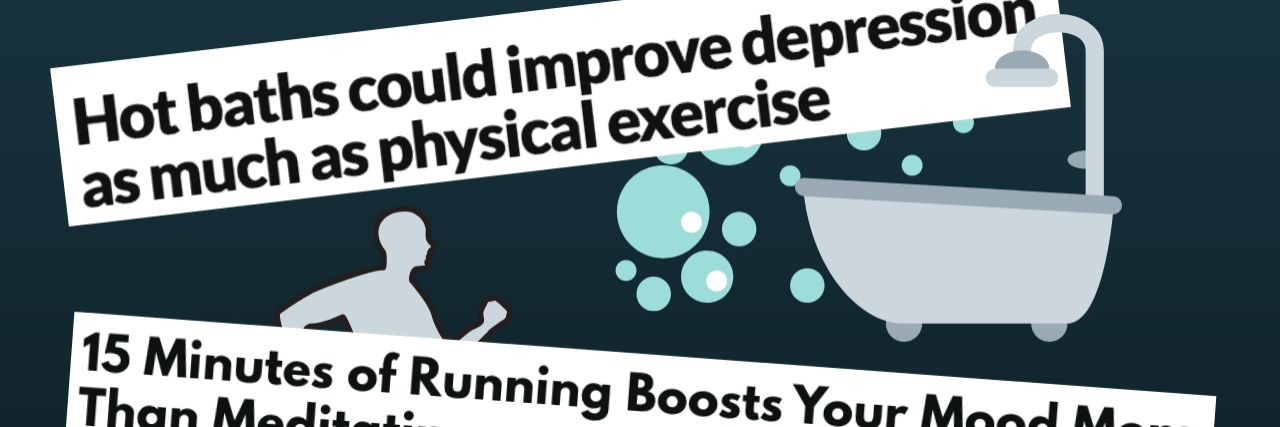We Need to Stop Pitting Depression Treatments Against Each Other
Sometimes the news isn’t as straightforward as it’s made to seem. Sarah Schuster, The Mighty’s mental health editor, explains what to keep in mind if you see this topic or similar stories in your newsfeed. This is The Mighty Takeaway.
You’re scrolling through Facebook mindlessly when a headline catches your eye. “Hot Baths Could Improve Depression as Much as Physical Exercise,” you read. Well, this is good news for you. You love taking baths, hate running, and have been struggling to manage your depression for awhile.
But shoot, didn’t you read the other day that running boost your mood more than meditation? Maybe you should be running in the morning instead of doing the meditation practice you’ve been trying to start.
But wait, if taking a bath is just as effective as running and running is more effective than meditating, maybe you should be taking a bath every morning? 
Living with depression is hard enough, damn it. It’s unhelpful — and frankly, annoying — when journalists frame small or bogus studies like they’re actually saying something definitive about how depression should be treated. “Hot Baths Could Improve Depression as Much as Physical Exercise” and “15 Minutes of Running Boosts Your Mood More Than Meditating” were both real headlines I saw on my timeline, and I couldn’t help but think how confusing it would be for someone who’s actually looking for good information about how to treat depression.
Depression is complicated, and treating it usually takes some trial and error. What works for one person might not work for another, and for many people, coping with depression means employing more than one “kind” of treatment. There’s rarely a “magic bullet” that makes all your symptoms go away — and for the example of the story that compared running and meditating, it’s actually more akin to comparing apples and oranges than comparing treatment options. It’s not useful to compare running and meditation because they serve different functions — one releases some endorphins, the other trains your mind to be more mindful. Some people might even use running as part of a mindfulness/meditation practice.
The comparison, then, is based on a false equivalence, declaring a “winner” among two things that shouldn’t be pitted against each other at all.
The point of meditation is not to boost your mood. This is as groundbreaking as having ppl rub potatoes for 15 minutes and then announcing that running boosts your mood more than potato rubbing. https://t.co/N5hidXPXoA
— Mark Freeman (@thepathtochange) October 16, 2018
At its worse, comparing ways to cope with depression and declaring a “winner” can increase stigma against certain types of treatment. For example, it’s all well and good that studies find exercise is an effective way to help people with depression, and maybe for some, it’s even more effective than meditation or antidepressants — but that doesn’t mean it’s a “superior” way of treating depression. Just because one study said running is as effective as antidepressants, doesn’t mean that those who take antidepressants simply need to run instead of taking the “chemical” and “lazy” way out…
See where I’m going with this?
We need more effective ways to treat depression. We need more research and more information. But we already know running can help people with depression. We already know meditation is good for your mental health. Sure, a hot bath might help someone with depression, why not?
Not everyone can run their way out of depression. Some people need running, meditation, bath-taking… and a whole bunch of other less “sexy” treatment options that don’t sound as relatable in a headline. We don’t need research that hashes out the same thing again and again, looking for different angles to prove one form of treatment works over another.
Instead, we need to inspire people to figure out what works for them and make sure they have access to that treatment. We need more innovative treatments that look at depression more holistically and considers the context in which everyone lives. Some people can run. Others can’t. There should be hope for both those kinds of people regardless.
At the end of the day, everyone needs to do whatever helps them manage their depression safely. If that means taking a bath every morning, go for it. If that means taking antidepressants, good for you. If that means something else entirely, whether it be an extreme life change or weekly therapy, I wish you luck. Don’t limit yourself. There is hope for you.

